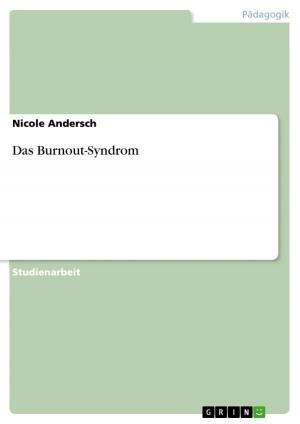Politeness Distinction in Personal Pronouns and the Concept of Face
Nonfiction, Entertainment, Drama, Anthologies| Author: | Cornelia Charlotte Reuscher | ISBN: | 9783638539166 |
| Publisher: | GRIN Verlag | Publication: | August 28, 2006 |
| Imprint: | GRIN Verlag | Language: | English |
| Author: | Cornelia Charlotte Reuscher |
| ISBN: | 9783638539166 |
| Publisher: | GRIN Verlag |
| Publication: | August 28, 2006 |
| Imprint: | GRIN Verlag |
| Language: | English |
Seminar paper from the year 2006 in the subject English Language and Literature Studies - Linguistics, grade: 2,0, University of Hamburg, course: Human Perspective and Language: Deixis, 11 entries in the bibliography, language: English, abstract: 1.Introduction This paper will deal with politeness distinctions in personal pronouns. Thus, le leading question will be: In how far can personal pronouns, being deictic expressions, serve as elements of politeness? To clarify this a little more, I would like to begin with a short explanation of the term 'deictic expression': Deictics, also known as 'pointing words', are for example: I, you, here, there, before, after. One can distinguish between person, local and time deixis. Special to deictics is the fact that they are meaningless unless we know who speaks and thus forms the center of orientation - the origo . Personal pronouns, however, form a category of person deixis. They relate to either the addressee or to someone talked about in a conversation, they 'characterize the referent as well with respect to the speech act role and the size of the respective speaker and hearer groups.' In a discourse, personal pronouns lexicalize the relation between the origo, which is the cognitive ground for an act of pointing, and the intended referent, who is the figure of the pointing act. Unlike in local or time deixis, this intended referent is a human being (I will omit the situations when human beings speak to animals here), not an inanimate thing like a piece of furniture or an abstract unit like for example a time span - in short, it makes a difference if I say something like: 'Here is the green chair', or 'It rained really hard yesterday.' or if I speak either about 'I have met that Mrs. Jones' or directly to 'You can leave the room now' other persons. If in direct address or not, the issue of politeness gets important in these cases. We can express distance and dislike in demonstratives as shown in the Mrs. Jones sentence, and we can be nice or rude depending on the form of address we use. As this paper thus will primarily be focused on person deixis, I will omit the topics of local and time deixis but investigate the use of person deictic expressions in their various uses with regard to the question of politeness. Therefore, I want to start with a chapter about politeness in general: What is politeness? Why are human beings polite (or impolite)? And how is this politeness conveyed through language? To specify the various strategies used to perform politeness, I will then introduce Brown and Levinson's concept of 'Face', and, later, draw the link to the use of personal pronouns. [...)
Seminar paper from the year 2006 in the subject English Language and Literature Studies - Linguistics, grade: 2,0, University of Hamburg, course: Human Perspective and Language: Deixis, 11 entries in the bibliography, language: English, abstract: 1.Introduction This paper will deal with politeness distinctions in personal pronouns. Thus, le leading question will be: In how far can personal pronouns, being deictic expressions, serve as elements of politeness? To clarify this a little more, I would like to begin with a short explanation of the term 'deictic expression': Deictics, also known as 'pointing words', are for example: I, you, here, there, before, after. One can distinguish between person, local and time deixis. Special to deictics is the fact that they are meaningless unless we know who speaks and thus forms the center of orientation - the origo . Personal pronouns, however, form a category of person deixis. They relate to either the addressee or to someone talked about in a conversation, they 'characterize the referent as well with respect to the speech act role and the size of the respective speaker and hearer groups.' In a discourse, personal pronouns lexicalize the relation between the origo, which is the cognitive ground for an act of pointing, and the intended referent, who is the figure of the pointing act. Unlike in local or time deixis, this intended referent is a human being (I will omit the situations when human beings speak to animals here), not an inanimate thing like a piece of furniture or an abstract unit like for example a time span - in short, it makes a difference if I say something like: 'Here is the green chair', or 'It rained really hard yesterday.' or if I speak either about 'I have met that Mrs. Jones' or directly to 'You can leave the room now' other persons. If in direct address or not, the issue of politeness gets important in these cases. We can express distance and dislike in demonstratives as shown in the Mrs. Jones sentence, and we can be nice or rude depending on the form of address we use. As this paper thus will primarily be focused on person deixis, I will omit the topics of local and time deixis but investigate the use of person deictic expressions in their various uses with regard to the question of politeness. Therefore, I want to start with a chapter about politeness in general: What is politeness? Why are human beings polite (or impolite)? And how is this politeness conveyed through language? To specify the various strategies used to perform politeness, I will then introduce Brown and Levinson's concept of 'Face', and, later, draw the link to the use of personal pronouns. [...)















